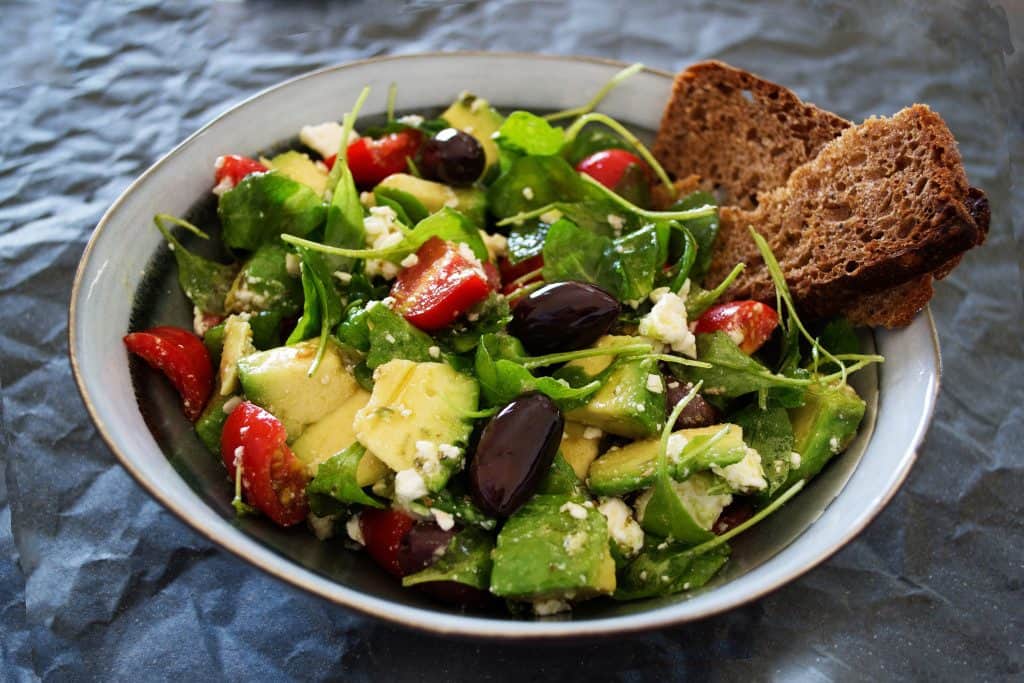
If you are searching for a nutrient-dense diet that may make you feel invigorated and help you live a long, healthy life, consider the Mediterranean Diet.
Studies show compelling evidence that this diet can increase lifespan.
But first, let’s review what the Mediterranean Diet is.
What is the Mediterranean Diet?
Many people have heard of the Mediterranean Diet. Like its name suggests, the premise bases meals on the types of foods traditionally found and eaten in sixteen Mediterranean countries. Picture the growing climate of areas like Spain, Greece and Italy, and you will have a general idea of what may comprise typical diets.
The Mediterranean region features rich in plants and olive oil. Carbohydrate sources are whole grains, fruits and high-fiber vegetables. Polyunsaturated and monounsaturated fats stem from fatty fish and olive oil.

What are mainstays of a Mediterranean-inspired diet?
Unlike many other programs, this diet features a huge variety of foods. To truly partake in this plan, certain edibles must be present[1].
- Fresh, low-starch vegetables: green beans, eggplants, broccoli, kale
- Fresh fruits: tomatoes, strawberries
- Fish and seafood: tuna, salmon, lobster
- Spices: garlic, basil, mint
- Oil: olive oil, avocado oil
- Seeds, raw nuts and legumes

Which foods are consumed in moderation?
- Poultry and eggs: duck, chicken
- Dairy: low-fat milk, yogurt
- Starchy vegetables: potatoes, yams
- Red wine
- Whole-grain breads and pastas
Which foods are severely restricted or prohibited?
- Refined sugars are prohibited.
- Lean red meat is restricted to once or twice a month.
- Refined grains should be eliminated.
- Refined oil (vegetable oil) and trans- and saturated fats should be avoided.
- Highly processed foods and processed meats are prohibited.
- Salt is limited.
The majority of your proteins should come from vegetables and fish. Six or more servings of vegetables per day is the norm, and fish should be eaten at least two times a week. Three small servings of dairy products rounds out the daily protein requirements.
Carbohydrates can come from three servings of fruits a day and one or two servings per day of breads, rice or pasta.
Finally, your sources for fat are small amounts of nuts or hummus every day along with olive oil for cooking and as a substitution for butter. Legumes provide both fats and protein and half a cup twice a week is a good way to provide a balancing touch to the diet.
What are possible benefits of the Mediterranean-based diet?
This diet can help you lose weight without major caloric restrictions. It encourages long-term changes in eating habits that makes permanent weight reduction more easily achieved. The balanced nutrition and food variety in this diet leaves you satisfied.
A diet rich in nutrients benefits heart health and may lower blood pressure [2]. You can reduce blood pressure by decreasing salt intake. However, the Mediterranean lifestyle goes beyond this. Its focus on the consumption of wholesome and natural foods promotes optimal function of the heart and inner lining of the blood vessels.
Dietary habits of Mediterranean residents are strongly linked to longevity.Chronic disease prevention plays a significant role in helping you enjoy a healthier and longer life.
A Mediterranean-based diet could reduce your risk for Alzheimer’s disease, dementia, Parkinson’s disease and even cancer. Low blood sugar levels, antioxidants and beneficial cholesterols maintain blood vessel health. This not only keeps your heart healthy, but also benefits your brain, muscles and nerves. Minimal consumption of processed foods and increased intake of foods with anti-oxidative and anti-inflammatory effects accounts for reduction in the incidence of cancer [3] and other debilitating diseases.
A Mediterranean nutritional program greatly reduces metabolic syndrome, according to Natural Medicine Journal [3]. Metabolic syndrome is a phenomenon believed responsible for certain breast and rectal cancers, Type II diabetes, heart disease and stroke. It also increases mortality associated with cancer. It can be controlled by diet because it relates to high blood pressure, bad cholesterol, high fasting glucose levels and obesity [4].

What are the possible reasons that a Mediterranean-style diet leads to a longer life?
High levels of antioxidants in olive oil, fruits and vegetables, and wild greens may explain the longer survival of people adhering to a diet rich in these foods. This particular food emphasis is specific to the Greek version of the diet. However, survival in all areas of the Mediterranean region is significantly higher than in many other localities. This phenomenon was observed via mortality statistics from 1960 to 1990.
A longer life directly relates not only to the food you ingest, but also to how you ration it(i.e. your eating pattern). Prior to 1960, the Greek diet consisted of copious amounts of fruits and vegetables, sourdough bread, minimal pasta, moderate wine and large amounts of olives and olive oil. Cheese replaced milk and fish replaced most meats.
High fiber, antioxidants and vitamins E and C are thought to aid in fighting off cancer. Selenium, balanced essential fatty acids and glutathione are known to protect against cancer. A traditional Greek diet based on ancient customs has high amounts of anti-cancer properties. These same substances also play a role in staving off heart disease.
Is this versatile diet too good to be true?
Original studies of how people lived around the Mediterranean Sea were based on populations that engaged in regular, strenuous physical activity. Exercise can benefit cardiac health, lower blood pressure, and prevent certain cancers and other debilitating diseases. Were we giving too much credit to diet for the exceptional health of Mediterranean natives?
The Mediterranean Diet may not be appropriate for people with elevated lipid levels. Although the program uses healthy sources of fat, some regimens call for less than 20% of monounsaturated fats.
A diet high in fish can pose risks of mercury and heavy metal exposure. It is prudent to be aware of the source of your fish and keep up with local advisories.
In Summary
Subsequent research has taken additional factors into account and determined that a diet based on the Mediterranean guidelines brings phenomenal improvement in mental and physical health even without exercise. If adopted as part of a lifestyle choice it brings the potential for great longevity and vigor.
References
[1] https://www.lifehealthhq.com/mediterranean-diet-food-list/
[2] https://www.health.harvard.edu/newsletter article/beating-high-blood-pressure-with-food/
[3] https://www.naturalmedicinejournal.com/journal/2017-05/mediterranean-diet-cancer-prevention/
[4] https://www.webmd.com/heart/metabolic-syndrome/metabolic-syndrome-what-is-it/


Tim is the founder of FitAtMidlife.com – an avid gym rat for 30+ years, he’s a reviewer of many, many shoes – and founder of the Speed Bag Gathering – the world’s only gathering of speed bag punching enthusiasts. See more gym reviews at Tim’s YouTube channel.


